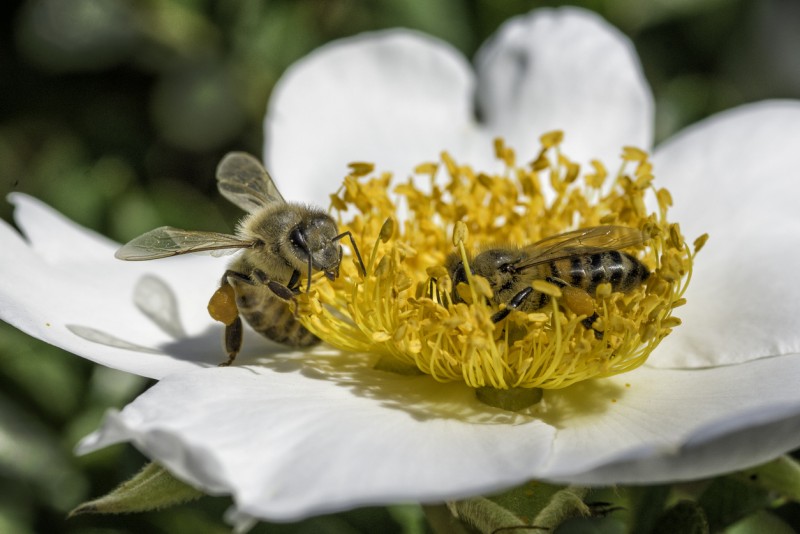How to Develop the Fruit of the Spirit: Spiritual Pollination
by Emerich Hamilton - March 28, 2022
The fruit of the Spirit is one of the most well-known analogies in the Bible. But there is an aspect of spiritual growth that is sometimes missed.

The fruit of the Spirit is often thought of as a list of character traits that Christians must have, which is true. However, the idea of producing spiritual fruit goes further than that.
To understand the fruit of the Spirit better, we can look at the development of literal fruit. Fruit, in simple terms, is a stage in the reproduction process of a plant.
To summarize: Before fruit is what we recognize as fruit, it is a flower. (It is interesting to note that while all fruits were flowers, not all flowers develop into fruit.) How does a flower become a fruit? Flowers, on their own, cannot become fruit.
First, they need to be pollinated. This is the process where pollen from the anthers of the male flower is transferred to the stigma of the female flower. From there, the pollen goes into the ovule and germinates, eventually becoming fruit.
However, the process does not stop there. The fruit is useless for reproducing new plants unless it releases its seeds, which then fall, or are carried, to later become a new plant.
Development of fruit
Similarly, we must first receive the Holy Spirit before we can develop spiritual fruit. As a flower opens its petals so that a bee or another pollinator can land and the pollen can fall into the stigma, so we must be open and receptive to the Holy Spirit so that it can successfully come into us.
As it states in Acts 2:38, “Repent, and let every one of you be baptized in the name of Jesus Christ for the remission of sins; and you shall receive the gift of the Holy Spirit.” To receive the Holy Spirit, we need to accept that we are sinners, repent of our sins, be baptized and have hands laid on us.
But receiving the Holy Spirit is not the end of the process. We must continue to grow and develop. Similarly, once a flower is pollinated, it must then develop into a fruit. Otherwise, it would be just a pretty thing to look at.
As it states in James 2:26, “For as the body without the spirit is dead, so faith without works is dead also.” If we do not grow and develop, then we cannot produce fruit. And, if we do not produce fruit, we are not fulfilling our purpose as Christians.
We cannot produce simply whatever fruit we want, however. Just as an apple tree cannot produce lemons, so we, if we use the Holy Spirit, cannot produce anything except the fruit of the Spirit.
As it states in Matthew 7:17, “Even so, every good tree bears good fruit, but a bad tree bears bad fruit.” If we do not produce good fruit—the fruit of the Spirit—then we are not functioning as we should, and we cannot be part of God’s family. A fruit tree that does not produce good fruit is useless.
Fruits and seeds
Plants produce fruit in order to produce seeds that, in turn, produce new plants, flowers, fruit and seeds. To follow the analogy, we must develop fruit that can be sown and produce more fruit. But how do we do that? In 1 Corinthians 11:1, it states, “Follow my example, just like I follow Christ’s” (Common English Bible). To produce spiritual fruit, we must follow Christ’s example. Christ is the ultimate example of bearing the fruit of the Spirit.
There is one detail that has not been examined, however. As it is described in Galatians 5:22-23, the fruit of the Spirit is a single fruit. We can compare it to an aggregated fruit, like a raspberry or blackberry—a single berry with many drupelets (the meaty casing covering the seeds).
Likewise, we can’t just produce one aspect of the fruit. To ensure that something will grow and spread, we must produce the entire fruit.
Journey of the seed
After a fruit drops to the ground, it then needs to be spread. Animals eat the berry and then deposit the seed in their droppings. Or wind or water can carry the berries away for the seed to spread to other locations. As we know from the parable of the sower in Matthew 13:1-9, God is the One who spreads the seed.
After reaching a resting place, the fruit then begins to decay, eventually providing nutrients to the seed and aiding in its growth. Likewise, when we demonstrate the fruit of the Spirit in our lives, our influence will spread. Our good example will (hopefully) stay with someone and set a positive example of what a Christian is, which can then help the seed flourish in another person. However, it is God who ultimately oversees where the seed falls and whether or not it takes root.
Once the seed germinates and grows within a person, the cycle begins again. The person must repent, be baptized and receive the Holy Spirit. And he or she, too, must grow spiritual fruit.
It is not our job to decide where we spread our fruit. It is our job to make sure we are producing fruit so that we can be productive members of God’s family and aid in producing more members.
Our job
So, we need to follow the example of the flower.
To fulfill our calling, we must flower and bear fruit. We must radiate love, joy, peace, patience, kindness, goodness, faithfulness, gentleness and self-control to those around us. We don’t do this to draw attention to ourselves, but to glorify God.
Continue Reading

Sharpen Your Ax
by Ken McIntosh - February 15, 2022

What It’s Like to Grow Up in the Philippines
by Mark Gideon Olat Agayo - January 27, 2022
